Internet & New Technology: Will It Replace Books as Chief Tool?
VerifiedAdded on 2023/06/11
|7
|1897
|115
Essay
AI Summary
This essay explores the possibility of the internet and other new technologies replacing books as the chief tool of learning. It argues that the internet has made learning cheaper, easier, and more accessible, with eBooks offering advantages like instant delivery, space efficiency, and interactive content. The essay highlights the growing trend of using eBooks in schools, the environmental benefits of reducing paper consumption, and the ability of the internet to facilitate shorter bursts of information consumption. However, it also addresses concerns about the potential impact on critical thinking abilities and attention spans, as raised by Nicholas Carr. The essay concludes that while the internet offers numerous advantages, its impact on cognitive skills remains a significant consideration.
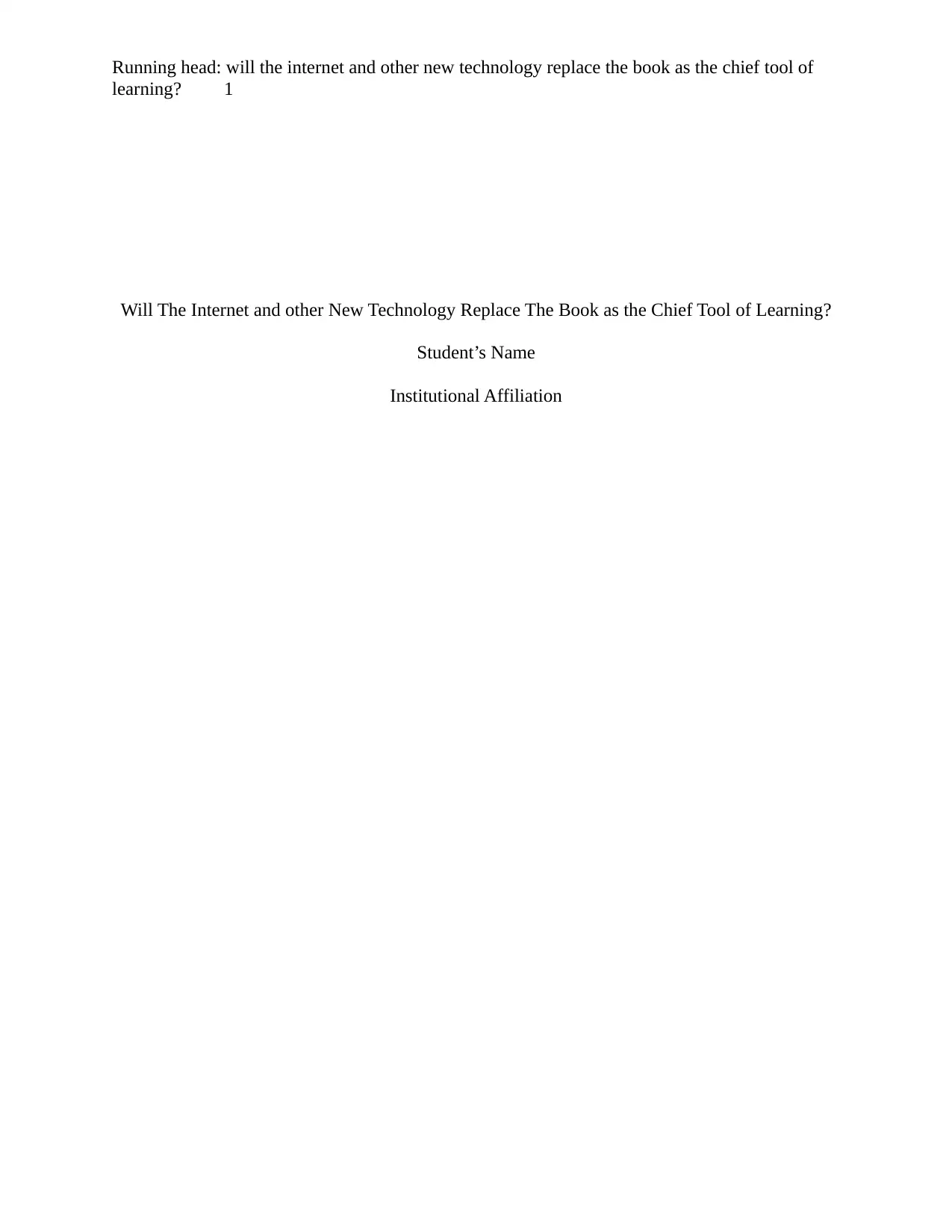
Running head: will the internet and other new technology replace the book as the chief tool of
learning? 1
Will The Internet and other New Technology Replace The Book as the Chief Tool of Learning?
Student’s Name
Institutional Affiliation
learning? 1
Will The Internet and other New Technology Replace The Book as the Chief Tool of Learning?
Student’s Name
Institutional Affiliation
Paraphrase This Document
Need a fresh take? Get an instant paraphrase of this document with our AI Paraphraser
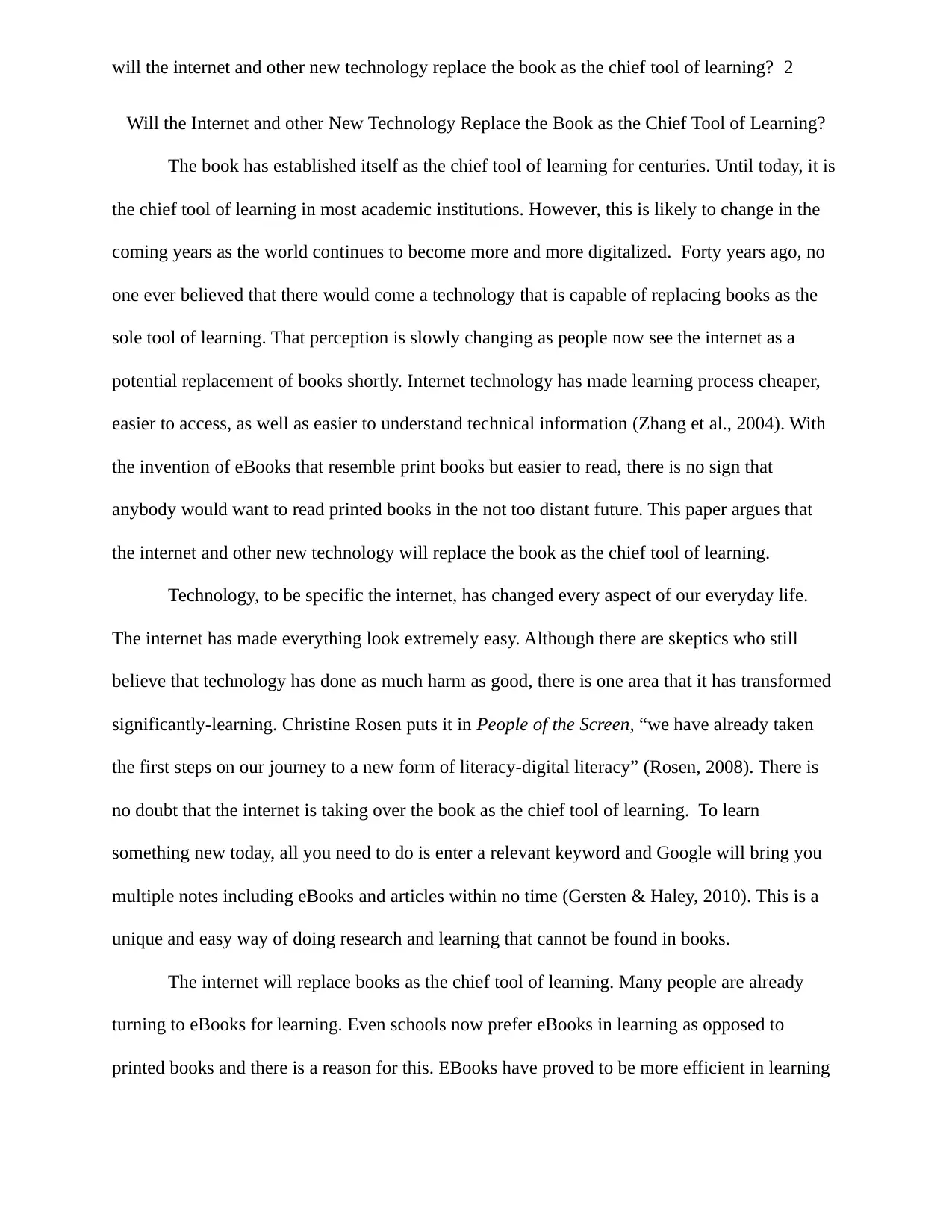
will the internet and other new technology replace the book as the chief tool of learning? 2
Will the Internet and other New Technology Replace the Book as the Chief Tool of Learning?
The book has established itself as the chief tool of learning for centuries. Until today, it is
the chief tool of learning in most academic institutions. However, this is likely to change in the
coming years as the world continues to become more and more digitalized. Forty years ago, no
one ever believed that there would come a technology that is capable of replacing books as the
sole tool of learning. That perception is slowly changing as people now see the internet as a
potential replacement of books shortly. Internet technology has made learning process cheaper,
easier to access, as well as easier to understand technical information (Zhang et al., 2004). With
the invention of eBooks that resemble print books but easier to read, there is no sign that
anybody would want to read printed books in the not too distant future. This paper argues that
the internet and other new technology will replace the book as the chief tool of learning.
Technology, to be specific the internet, has changed every aspect of our everyday life.
The internet has made everything look extremely easy. Although there are skeptics who still
believe that technology has done as much harm as good, there is one area that it has transformed
significantly-learning. Christine Rosen puts it in People of the Screen, “we have already taken
the first steps on our journey to a new form of literacy-digital literacy” (Rosen, 2008). There is
no doubt that the internet is taking over the book as the chief tool of learning. To learn
something new today, all you need to do is enter a relevant keyword and Google will bring you
multiple notes including eBooks and articles within no time (Gersten & Haley, 2010). This is a
unique and easy way of doing research and learning that cannot be found in books.
The internet will replace books as the chief tool of learning. Many people are already
turning to eBooks for learning. Even schools now prefer eBooks in learning as opposed to
printed books and there is a reason for this. EBooks have proved to be more efficient in learning
Will the Internet and other New Technology Replace the Book as the Chief Tool of Learning?
The book has established itself as the chief tool of learning for centuries. Until today, it is
the chief tool of learning in most academic institutions. However, this is likely to change in the
coming years as the world continues to become more and more digitalized. Forty years ago, no
one ever believed that there would come a technology that is capable of replacing books as the
sole tool of learning. That perception is slowly changing as people now see the internet as a
potential replacement of books shortly. Internet technology has made learning process cheaper,
easier to access, as well as easier to understand technical information (Zhang et al., 2004). With
the invention of eBooks that resemble print books but easier to read, there is no sign that
anybody would want to read printed books in the not too distant future. This paper argues that
the internet and other new technology will replace the book as the chief tool of learning.
Technology, to be specific the internet, has changed every aspect of our everyday life.
The internet has made everything look extremely easy. Although there are skeptics who still
believe that technology has done as much harm as good, there is one area that it has transformed
significantly-learning. Christine Rosen puts it in People of the Screen, “we have already taken
the first steps on our journey to a new form of literacy-digital literacy” (Rosen, 2008). There is
no doubt that the internet is taking over the book as the chief tool of learning. To learn
something new today, all you need to do is enter a relevant keyword and Google will bring you
multiple notes including eBooks and articles within no time (Gersten & Haley, 2010). This is a
unique and easy way of doing research and learning that cannot be found in books.
The internet will replace books as the chief tool of learning. Many people are already
turning to eBooks for learning. Even schools now prefer eBooks in learning as opposed to
printed books and there is a reason for this. EBooks have proved to be more efficient in learning
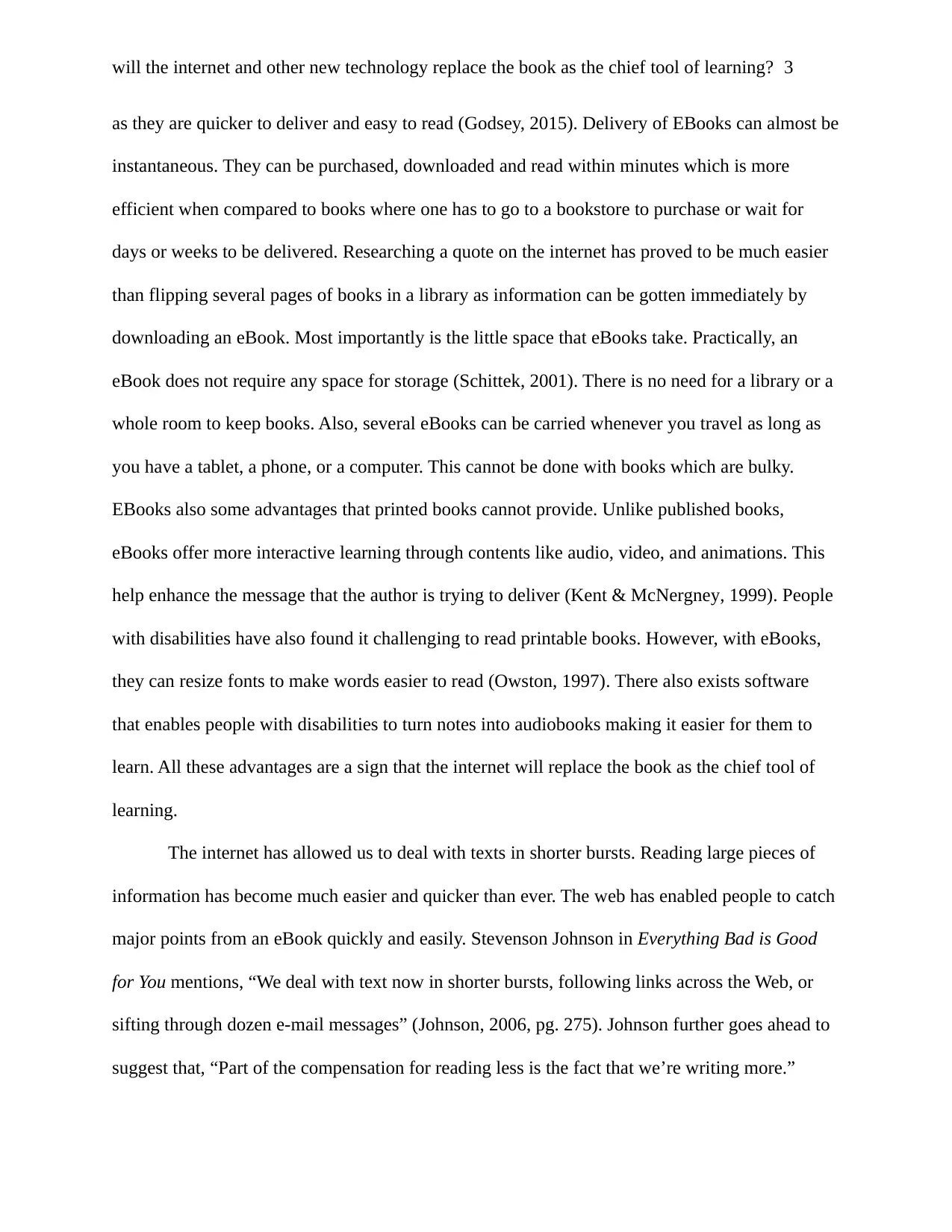
will the internet and other new technology replace the book as the chief tool of learning? 3
as they are quicker to deliver and easy to read (Godsey, 2015). Delivery of EBooks can almost be
instantaneous. They can be purchased, downloaded and read within minutes which is more
efficient when compared to books where one has to go to a bookstore to purchase or wait for
days or weeks to be delivered. Researching a quote on the internet has proved to be much easier
than flipping several pages of books in a library as information can be gotten immediately by
downloading an eBook. Most importantly is the little space that eBooks take. Practically, an
eBook does not require any space for storage (Schittek, 2001). There is no need for a library or a
whole room to keep books. Also, several eBooks can be carried whenever you travel as long as
you have a tablet, a phone, or a computer. This cannot be done with books which are bulky.
EBooks also some advantages that printed books cannot provide. Unlike published books,
eBooks offer more interactive learning through contents like audio, video, and animations. This
help enhance the message that the author is trying to deliver (Kent & McNergney, 1999). People
with disabilities have also found it challenging to read printable books. However, with eBooks,
they can resize fonts to make words easier to read (Owston, 1997). There also exists software
that enables people with disabilities to turn notes into audiobooks making it easier for them to
learn. All these advantages are a sign that the internet will replace the book as the chief tool of
learning.
The internet has allowed us to deal with texts in shorter bursts. Reading large pieces of
information has become much easier and quicker than ever. The web has enabled people to catch
major points from an eBook quickly and easily. Stevenson Johnson in Everything Bad is Good
for You mentions, “We deal with text now in shorter bursts, following links across the Web, or
sifting through dozen e-mail messages” (Johnson, 2006, pg. 275). Johnson further goes ahead to
suggest that, “Part of the compensation for reading less is the fact that we’re writing more.”
as they are quicker to deliver and easy to read (Godsey, 2015). Delivery of EBooks can almost be
instantaneous. They can be purchased, downloaded and read within minutes which is more
efficient when compared to books where one has to go to a bookstore to purchase or wait for
days or weeks to be delivered. Researching a quote on the internet has proved to be much easier
than flipping several pages of books in a library as information can be gotten immediately by
downloading an eBook. Most importantly is the little space that eBooks take. Practically, an
eBook does not require any space for storage (Schittek, 2001). There is no need for a library or a
whole room to keep books. Also, several eBooks can be carried whenever you travel as long as
you have a tablet, a phone, or a computer. This cannot be done with books which are bulky.
EBooks also some advantages that printed books cannot provide. Unlike published books,
eBooks offer more interactive learning through contents like audio, video, and animations. This
help enhance the message that the author is trying to deliver (Kent & McNergney, 1999). People
with disabilities have also found it challenging to read printable books. However, with eBooks,
they can resize fonts to make words easier to read (Owston, 1997). There also exists software
that enables people with disabilities to turn notes into audiobooks making it easier for them to
learn. All these advantages are a sign that the internet will replace the book as the chief tool of
learning.
The internet has allowed us to deal with texts in shorter bursts. Reading large pieces of
information has become much easier and quicker than ever. The web has enabled people to catch
major points from an eBook quickly and easily. Stevenson Johnson in Everything Bad is Good
for You mentions, “We deal with text now in shorter bursts, following links across the Web, or
sifting through dozen e-mail messages” (Johnson, 2006, pg. 275). Johnson further goes ahead to
suggest that, “Part of the compensation for reading less is the fact that we’re writing more.”
⊘ This is a preview!⊘
Do you want full access?
Subscribe today to unlock all pages.

Trusted by 1+ million students worldwide
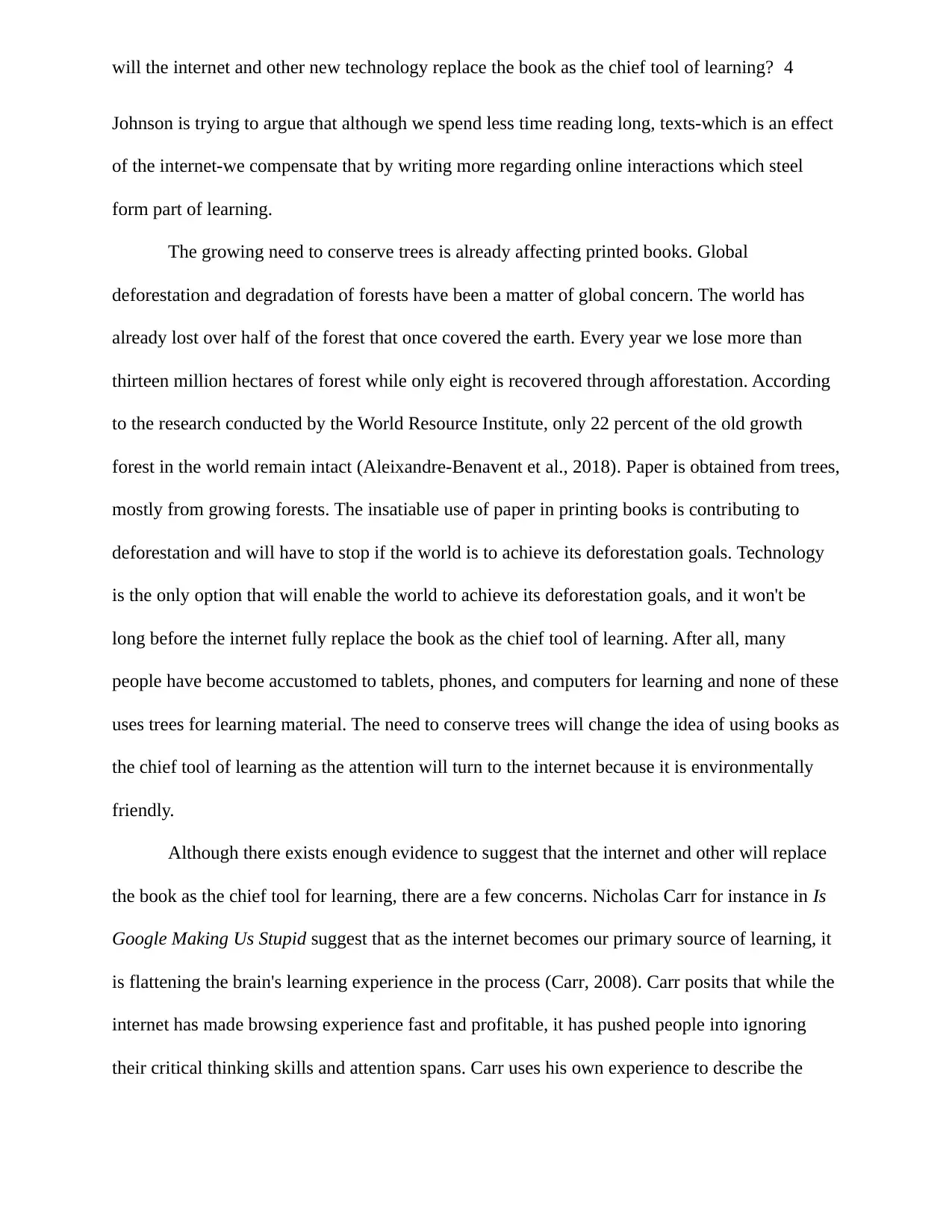
will the internet and other new technology replace the book as the chief tool of learning? 4
Johnson is trying to argue that although we spend less time reading long, texts-which is an effect
of the internet-we compensate that by writing more regarding online interactions which steel
form part of learning.
The growing need to conserve trees is already affecting printed books. Global
deforestation and degradation of forests have been a matter of global concern. The world has
already lost over half of the forest that once covered the earth. Every year we lose more than
thirteen million hectares of forest while only eight is recovered through afforestation. According
to the research conducted by the World Resource Institute, only 22 percent of the old growth
forest in the world remain intact (Aleixandre-Benavent et al., 2018). Paper is obtained from trees,
mostly from growing forests. The insatiable use of paper in printing books is contributing to
deforestation and will have to stop if the world is to achieve its deforestation goals. Technology
is the only option that will enable the world to achieve its deforestation goals, and it won't be
long before the internet fully replace the book as the chief tool of learning. After all, many
people have become accustomed to tablets, phones, and computers for learning and none of these
uses trees for learning material. The need to conserve trees will change the idea of using books as
the chief tool of learning as the attention will turn to the internet because it is environmentally
friendly.
Although there exists enough evidence to suggest that the internet and other will replace
the book as the chief tool for learning, there are a few concerns. Nicholas Carr for instance in Is
Google Making Us Stupid suggest that as the internet becomes our primary source of learning, it
is flattening the brain's learning experience in the process (Carr, 2008). Carr posits that while the
internet has made browsing experience fast and profitable, it has pushed people into ignoring
their critical thinking skills and attention spans. Carr uses his own experience to describe the
Johnson is trying to argue that although we spend less time reading long, texts-which is an effect
of the internet-we compensate that by writing more regarding online interactions which steel
form part of learning.
The growing need to conserve trees is already affecting printed books. Global
deforestation and degradation of forests have been a matter of global concern. The world has
already lost over half of the forest that once covered the earth. Every year we lose more than
thirteen million hectares of forest while only eight is recovered through afforestation. According
to the research conducted by the World Resource Institute, only 22 percent of the old growth
forest in the world remain intact (Aleixandre-Benavent et al., 2018). Paper is obtained from trees,
mostly from growing forests. The insatiable use of paper in printing books is contributing to
deforestation and will have to stop if the world is to achieve its deforestation goals. Technology
is the only option that will enable the world to achieve its deforestation goals, and it won't be
long before the internet fully replace the book as the chief tool of learning. After all, many
people have become accustomed to tablets, phones, and computers for learning and none of these
uses trees for learning material. The need to conserve trees will change the idea of using books as
the chief tool of learning as the attention will turn to the internet because it is environmentally
friendly.
Although there exists enough evidence to suggest that the internet and other will replace
the book as the chief tool for learning, there are a few concerns. Nicholas Carr for instance in Is
Google Making Us Stupid suggest that as the internet becomes our primary source of learning, it
is flattening the brain's learning experience in the process (Carr, 2008). Carr posits that while the
internet has made browsing experience fast and profitable, it has pushed people into ignoring
their critical thinking skills and attention spans. Carr uses his own experience to describe the
Paraphrase This Document
Need a fresh take? Get an instant paraphrase of this document with our AI Paraphraser
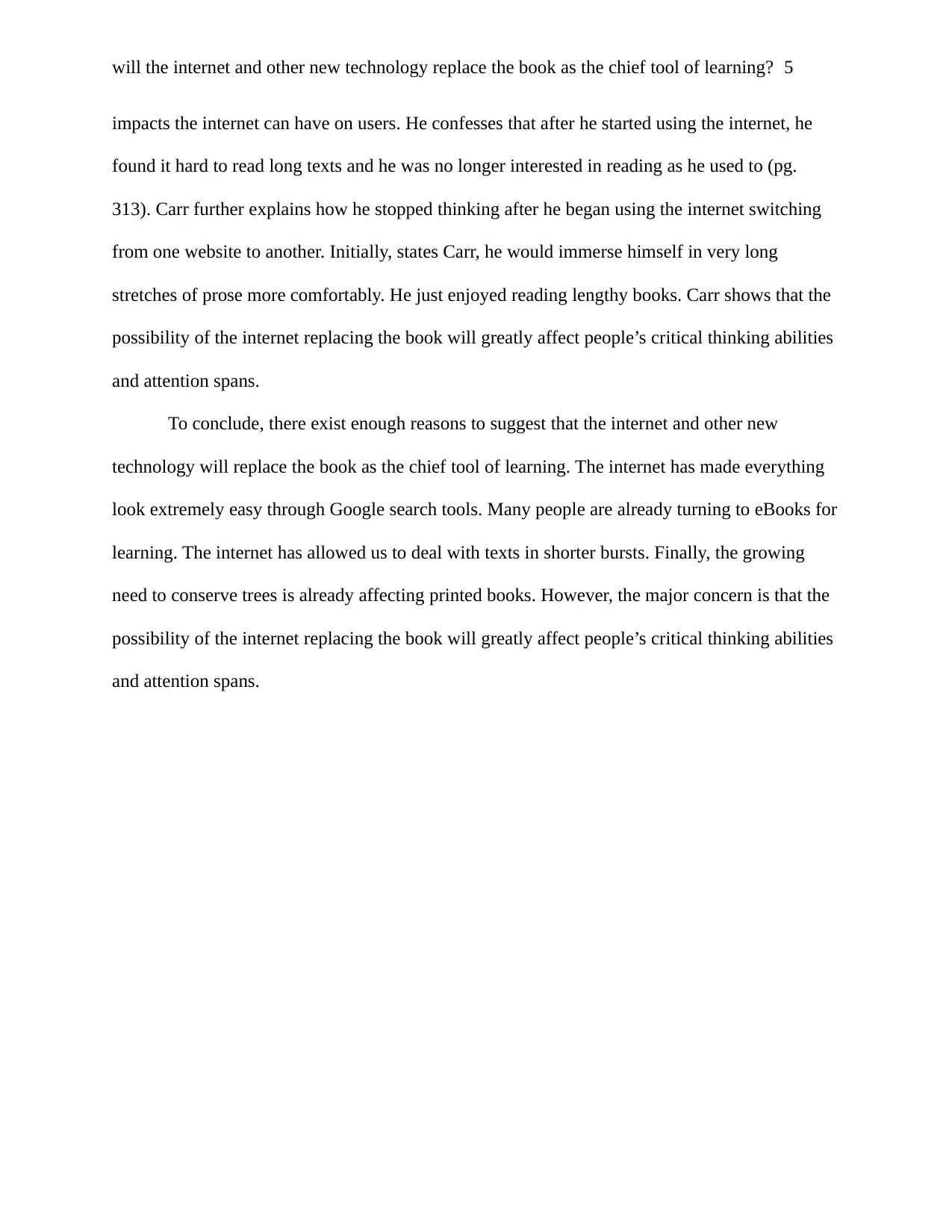
will the internet and other new technology replace the book as the chief tool of learning? 5
impacts the internet can have on users. He confesses that after he started using the internet, he
found it hard to read long texts and he was no longer interested in reading as he used to (pg.
313). Carr further explains how he stopped thinking after he began using the internet switching
from one website to another. Initially, states Carr, he would immerse himself in very long
stretches of prose more comfortably. He just enjoyed reading lengthy books. Carr shows that the
possibility of the internet replacing the book will greatly affect people’s critical thinking abilities
and attention spans.
To conclude, there exist enough reasons to suggest that the internet and other new
technology will replace the book as the chief tool of learning. The internet has made everything
look extremely easy through Google search tools. Many people are already turning to eBooks for
learning. The internet has allowed us to deal with texts in shorter bursts. Finally, the growing
need to conserve trees is already affecting printed books. However, the major concern is that the
possibility of the internet replacing the book will greatly affect people’s critical thinking abilities
and attention spans.
impacts the internet can have on users. He confesses that after he started using the internet, he
found it hard to read long texts and he was no longer interested in reading as he used to (pg.
313). Carr further explains how he stopped thinking after he began using the internet switching
from one website to another. Initially, states Carr, he would immerse himself in very long
stretches of prose more comfortably. He just enjoyed reading lengthy books. Carr shows that the
possibility of the internet replacing the book will greatly affect people’s critical thinking abilities
and attention spans.
To conclude, there exist enough reasons to suggest that the internet and other new
technology will replace the book as the chief tool of learning. The internet has made everything
look extremely easy through Google search tools. Many people are already turning to eBooks for
learning. The internet has allowed us to deal with texts in shorter bursts. Finally, the growing
need to conserve trees is already affecting printed books. However, the major concern is that the
possibility of the internet replacing the book will greatly affect people’s critical thinking abilities
and attention spans.
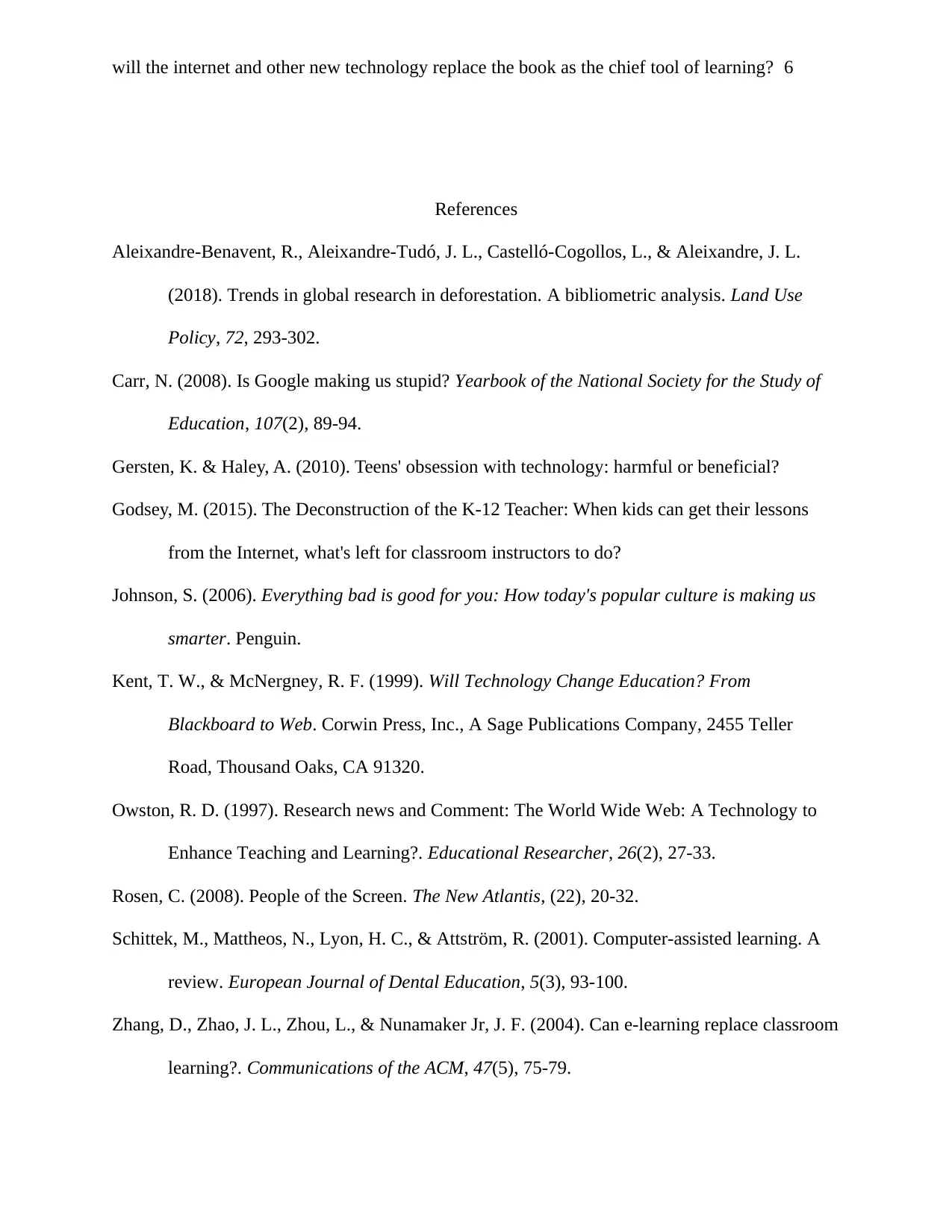
will the internet and other new technology replace the book as the chief tool of learning? 6
References
Aleixandre-Benavent, R., Aleixandre-Tudó, J. L., Castelló-Cogollos, L., & Aleixandre, J. L.
(2018). Trends in global research in deforestation. A bibliometric analysis. Land Use
Policy, 72, 293-302.
Carr, N. (2008). Is Google making us stupid? Yearbook of the National Society for the Study of
Education, 107(2), 89-94.
Gersten, K. & Haley, A. (2010). Teens' obsession with technology: harmful or beneficial?
Godsey, M. (2015). The Deconstruction of the K-12 Teacher: When kids can get their lessons
from the Internet, what's left for classroom instructors to do?
Johnson, S. (2006). Everything bad is good for you: How today's popular culture is making us
smarter. Penguin.
Kent, T. W., & McNergney, R. F. (1999). Will Technology Change Education? From
Blackboard to Web. Corwin Press, Inc., A Sage Publications Company, 2455 Teller
Road, Thousand Oaks, CA 91320.
Owston, R. D. (1997). Research news and Comment: The World Wide Web: A Technology to
Enhance Teaching and Learning?. Educational Researcher, 26(2), 27-33.
Rosen, C. (2008). People of the Screen. The New Atlantis, (22), 20-32.
Schittek, M., Mattheos, N., Lyon, H. C., & Attström, R. (2001). Computer-assisted learning. A
review. European Journal of Dental Education, 5(3), 93-100.
Zhang, D., Zhao, J. L., Zhou, L., & Nunamaker Jr, J. F. (2004). Can e-learning replace classroom
learning?. Communications of the ACM, 47(5), 75-79.
References
Aleixandre-Benavent, R., Aleixandre-Tudó, J. L., Castelló-Cogollos, L., & Aleixandre, J. L.
(2018). Trends in global research in deforestation. A bibliometric analysis. Land Use
Policy, 72, 293-302.
Carr, N. (2008). Is Google making us stupid? Yearbook of the National Society for the Study of
Education, 107(2), 89-94.
Gersten, K. & Haley, A. (2010). Teens' obsession with technology: harmful or beneficial?
Godsey, M. (2015). The Deconstruction of the K-12 Teacher: When kids can get their lessons
from the Internet, what's left for classroom instructors to do?
Johnson, S. (2006). Everything bad is good for you: How today's popular culture is making us
smarter. Penguin.
Kent, T. W., & McNergney, R. F. (1999). Will Technology Change Education? From
Blackboard to Web. Corwin Press, Inc., A Sage Publications Company, 2455 Teller
Road, Thousand Oaks, CA 91320.
Owston, R. D. (1997). Research news and Comment: The World Wide Web: A Technology to
Enhance Teaching and Learning?. Educational Researcher, 26(2), 27-33.
Rosen, C. (2008). People of the Screen. The New Atlantis, (22), 20-32.
Schittek, M., Mattheos, N., Lyon, H. C., & Attström, R. (2001). Computer-assisted learning. A
review. European Journal of Dental Education, 5(3), 93-100.
Zhang, D., Zhao, J. L., Zhou, L., & Nunamaker Jr, J. F. (2004). Can e-learning replace classroom
learning?. Communications of the ACM, 47(5), 75-79.
⊘ This is a preview!⊘
Do you want full access?
Subscribe today to unlock all pages.

Trusted by 1+ million students worldwide

will the internet and other new technology replace the book as the chief tool of learning? 7
1 out of 7
Related Documents
Your All-in-One AI-Powered Toolkit for Academic Success.
+13062052269
info@desklib.com
Available 24*7 on WhatsApp / Email
![[object Object]](/_next/static/media/star-bottom.7253800d.svg)
Unlock your academic potential
Copyright © 2020–2026 A2Z Services. All Rights Reserved. Developed and managed by ZUCOL.





